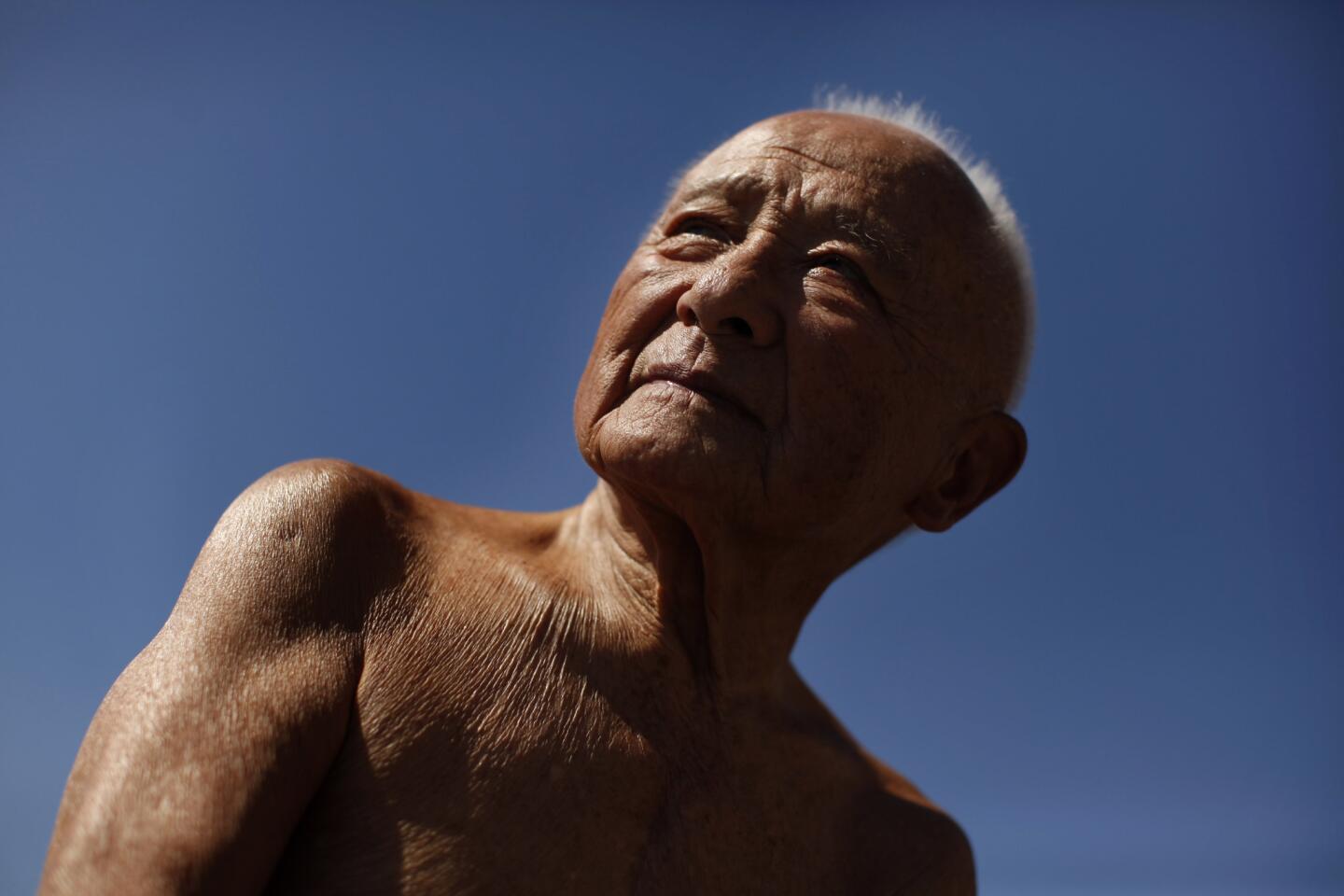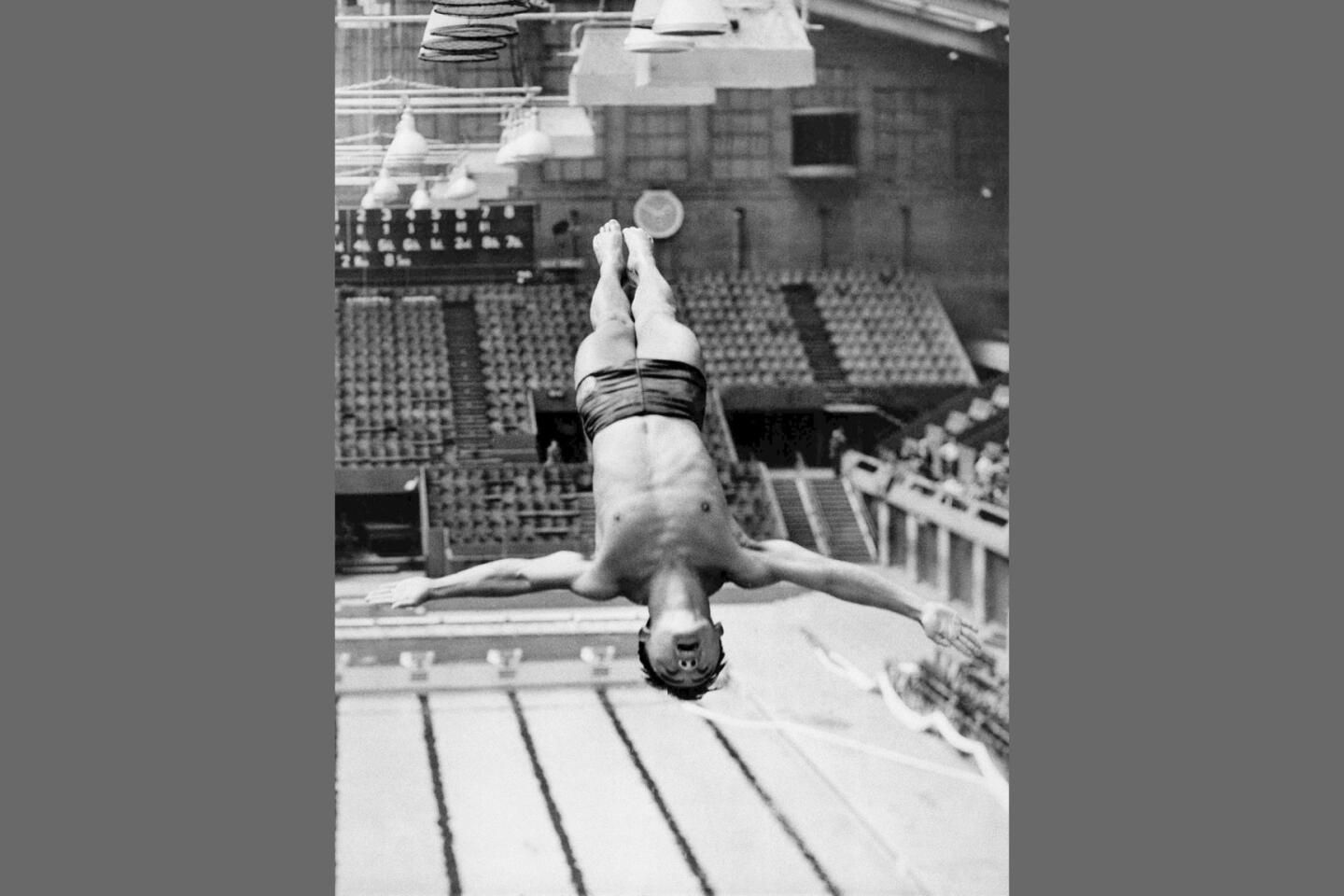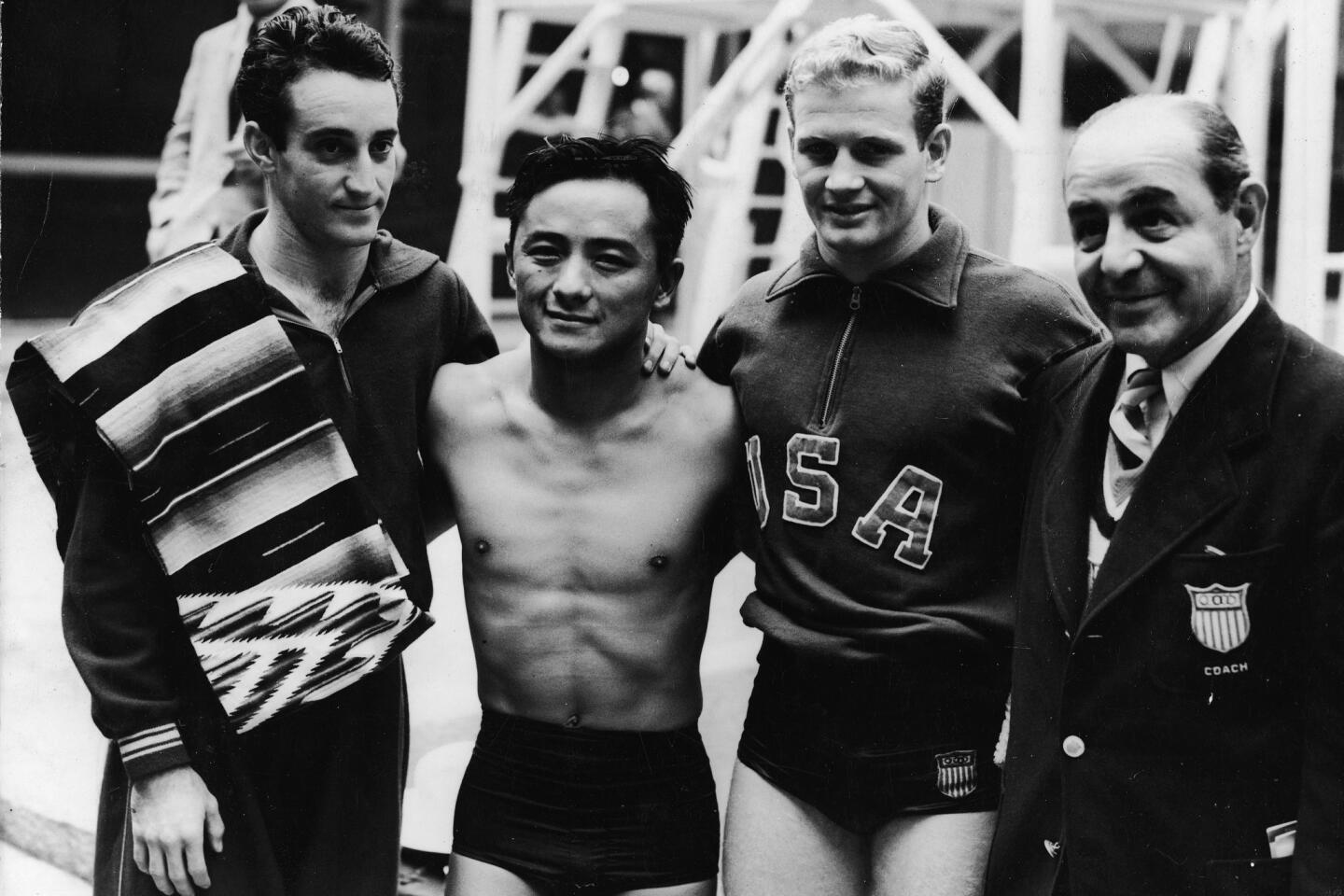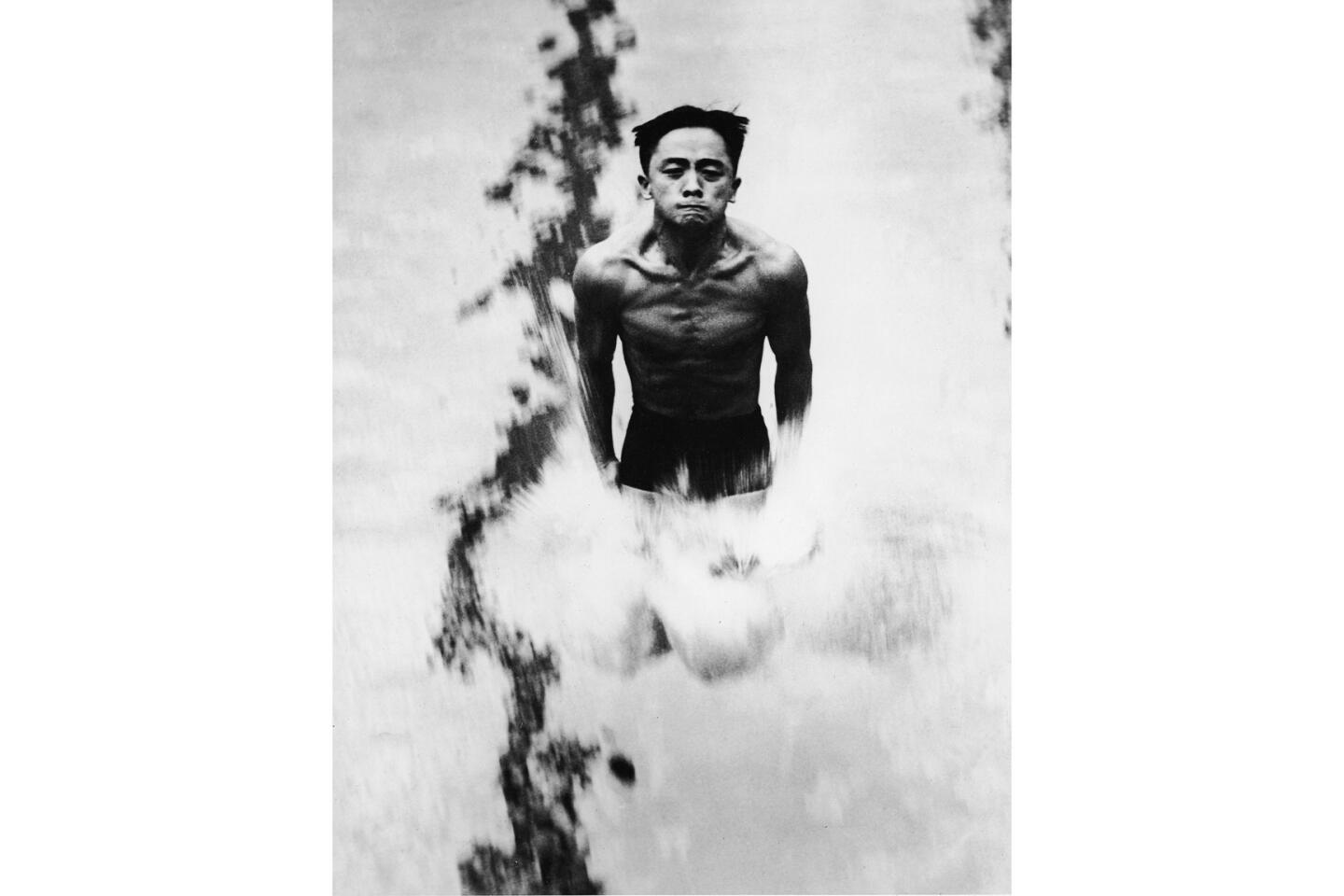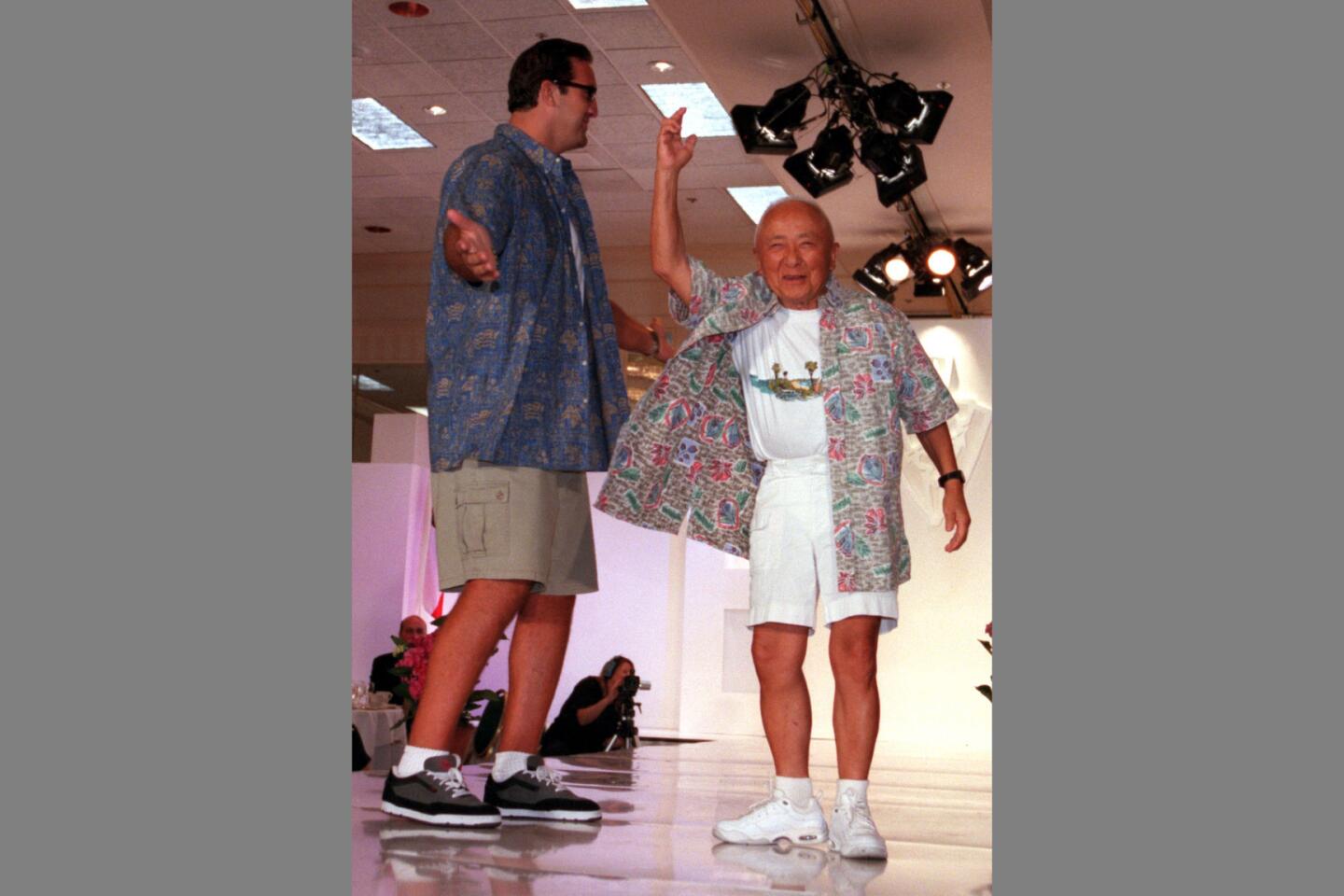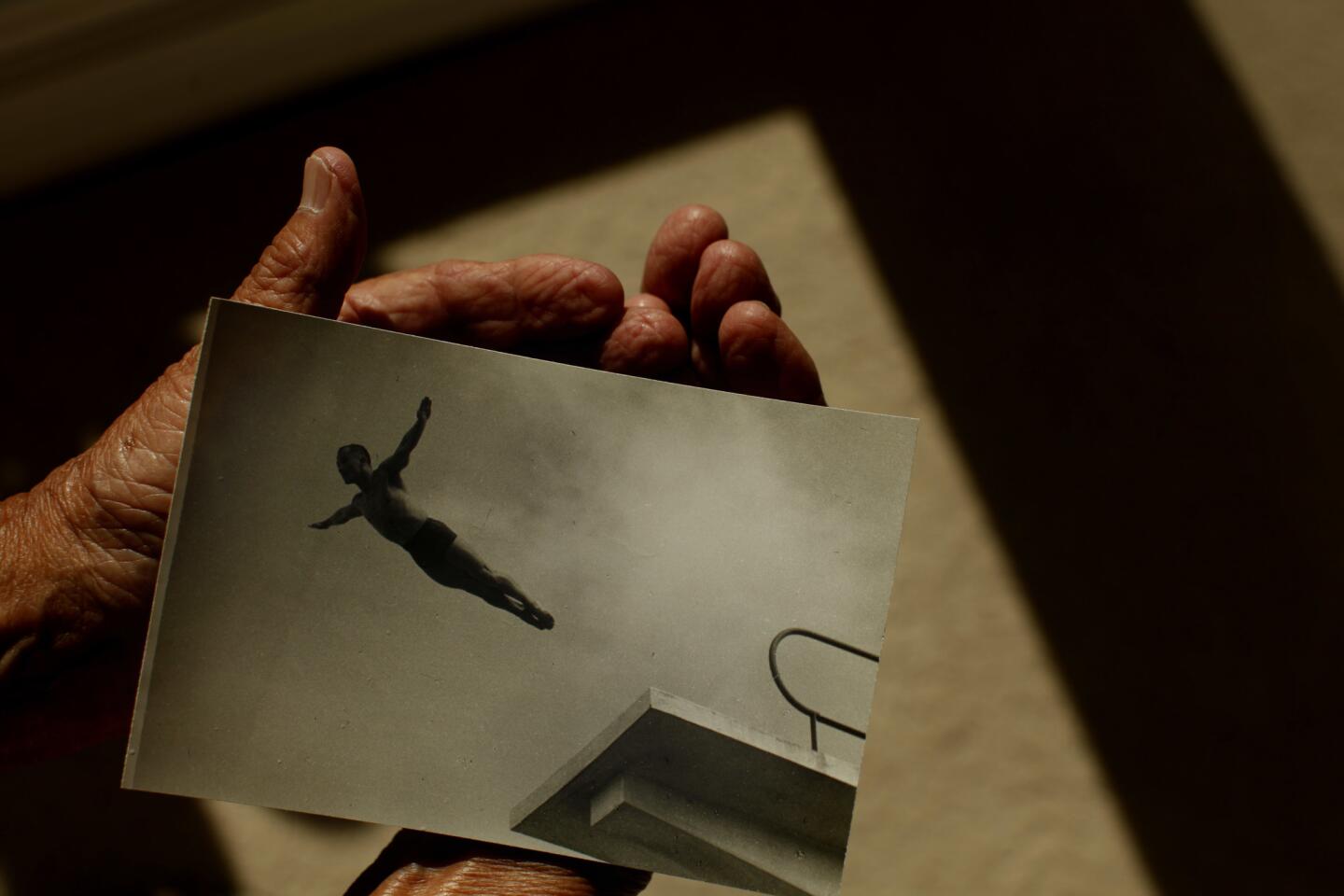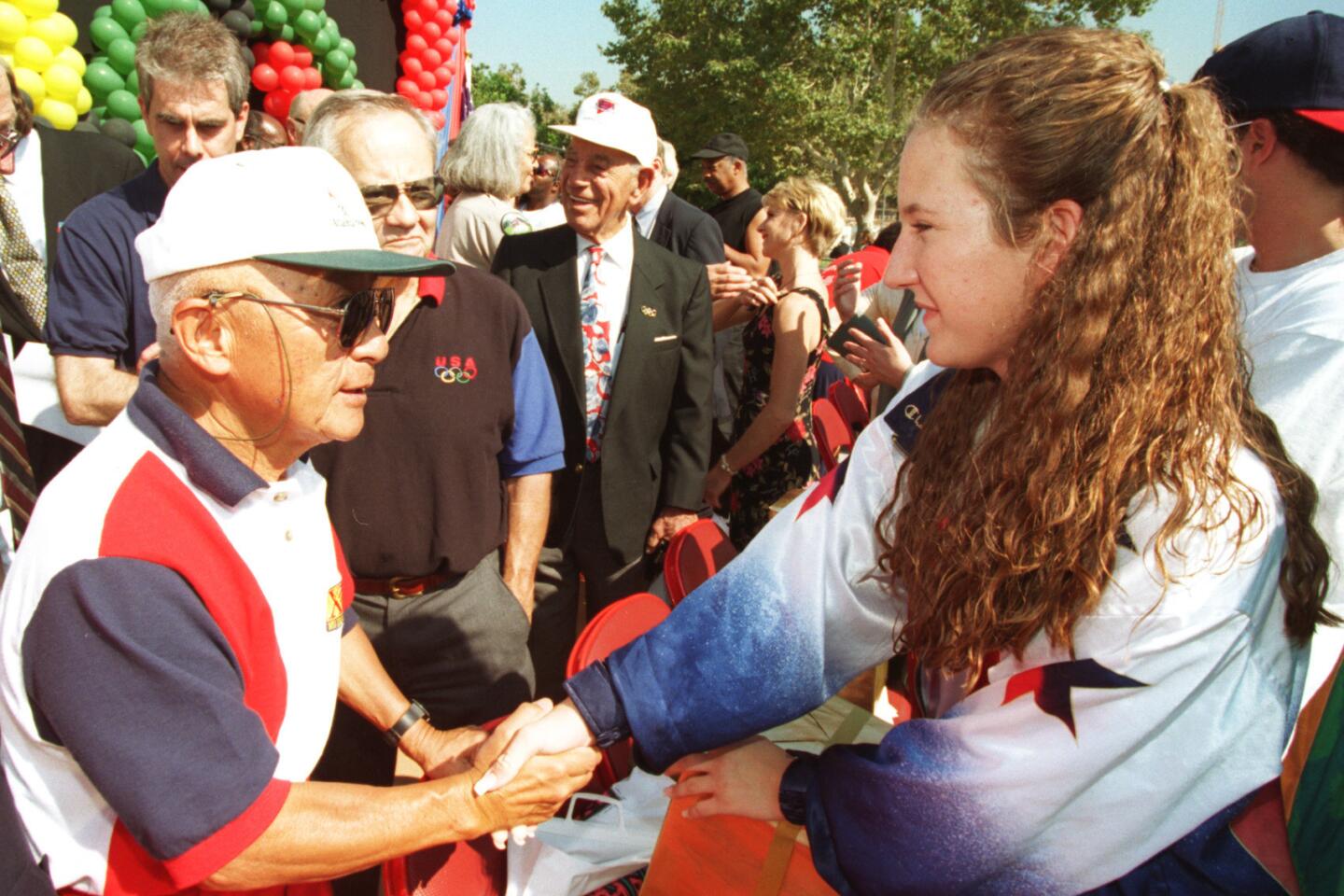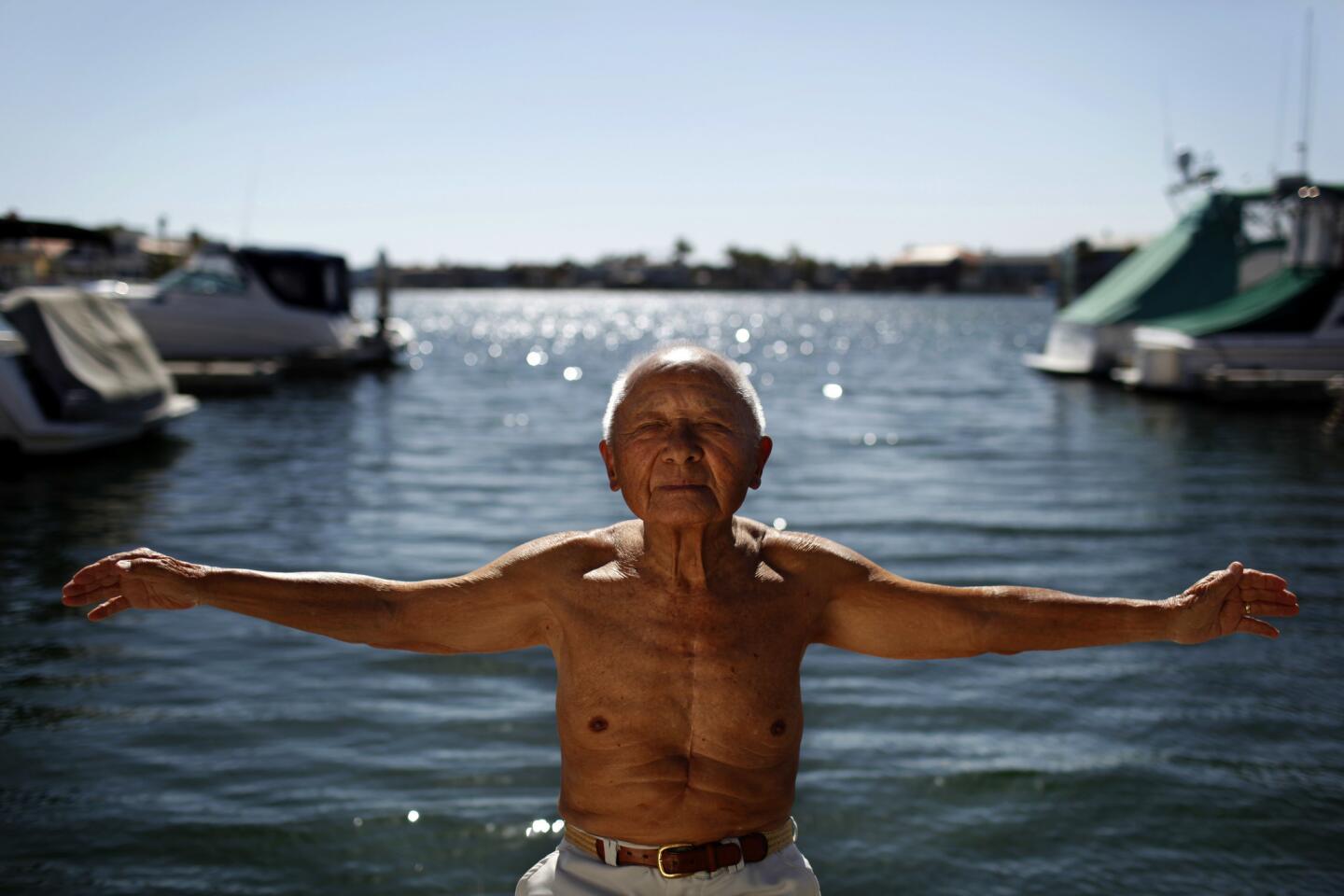Sammy Lee, diver who became first Asian American to win Olympic medal, dies at 96
- Share via
Sammy Lee learned to dive at Pasadena’s Brookside Park pool, which until 1940 allowed people of color to use the facilities only on Wednesdays, the day before it was drained and refilled. His most reliable place to work out was waterless — a diving board installed over a sand pit he dug in his coach’s backyard.
The inescapable racism “inspired me to perform,” Lee, the son of Korean immigrants, once said. “I was angered, but I was going to prove that in America, I could do anything.”
Lee overcame discrimination to become the first Asian American to win an Olympic medal and the first diver to win back-to-back gold medals in two different Olympics — in London in 1948 and Helsinki in 1952.
A retired doctor who also coached Olympians, Lee died in Newport Beach on Friday after suffering from pneumonia. He was 96.
In a Facebook post Saturday announcing Lee’s death, his daughter-in-law, Gina Lee, described him as a “true giant, a fearless leader, a magnificent and loving family man and a hero amongst the Olympic and Medical world....he dove into our hearts and will be truly missed.”
At 12, he was exposed to the Olympics while riding in his father’s Model T truck through Los Angeles streets decked out for the 1932 competition. When his father explained that the Games crown “the greatest athletes in the world,” Lee vowed to become an Olympic champion.
That summer, while playing at a Highland Park pool, a friend challenged him to do more than a single flip off the diving board. With his friend jumping behind him to provide extra lift, Lee immediately did a 1 1/2 somersault and ran home to tell his family he had found his sport, the Journal of Olympic History reported in 2002.
His Olympic quest began in earnest in the summer of 1938, while he was sneaking in practice dives between meets at the Los Angeles Swimming Stadium near the Coliseum. He looked over to see a bear of a man named Jim Ryan, who needled him to do a swan dive.
“I did what I thought was this perfect dive,” Lee told the Journal. “He said, ‘Who taught you that?’ When I told him, he said, ‘I want you to go over and kick him right in the butt. He’s trying to ruin you.’ ”
Ryan was nursing a grudge that rivaled his huge frame. He had coached Farid Simaika of Egypt to the gold at the 1928 Olympics but because of a “scoring error,” Simaika took home the silver instead, the Journal recounted. The gold went to Pete Desjardins, an American.
Cursing the judges, Ryan vowed to return with a nonwhite diver who could win without question.
“You are that diver,” Simaika told Lee. “That is why he is so tough on you. You will have to earn that gold by doing dives so well that they will not notice your color but only your diving.”
While attending Occidental College, Lee had become the 1942 national champion in platform and 3-meter springboard diving and won the platform title again in 1946. But World War II canceled the 1940 and 1944 Games, delaying his Olympic debut.
He finally reached the Games in 1948. As a 28-year-old lieutenant in the Army Medical Corps, Lee feared he had belly-flopped on his last dive at the London competition, a then-unprecedented 3 1/2 somersault, but he emerged from the water to discover it had been rated almost perfect.
“I just walked on water out of that pool,” he later recalled. He already had won the bronze medal in the 3-meter springboard.
Conflict again nearly kept Lee from competing in his second Olympics when he felt duty-bound to serve in the Korean War. His military superiors thought otherwise.
“Major Lee, we’ve only got one doctor who can win an Olympic gold medal. We’ve got hundreds of doctors who can repair the wounded. You can go, but you better win,” one of Gen. Dwight D. Eisenhower’s staff members told him, The Times reported in 2000.
At the Helsinki Games in 1952, the 5-foot-1 Lee won his second gold medal in platform diving on his 32nd birthday. The next year, he received the Sullivan Award, given to the nation’s outstanding amateur athlete.
As a diving coach, Lee was known as a great but insistent teacher.
He coached Bob Webster, the second U.S. diver to win two back-to-back Olympic gold medals in the platform, and four-time American gold medalist Greg Louganis, who lived with Lee’s family before winning a silver medal in the platform at at the 1976 Olympics when he was 16.
Lee also coached the 1960 U.S. Olympic diving team and the 1964 Japanese and Korean Olympic teams.
As a coach, he paid it forward. He never asked for payment, he told The Times in 1966, because his coaches had never charged him.
“He gave me one of the greatest gifts an individual can give another. He gave me self-esteem and a belief in myself,” Webster said. “Without Sammy, I don’t know what I would’ve done in diving or went on to do in life.”
Just out of high school in Santa Ana, one of Webster’s friends suggested Lee give him a chance. Lee watched Webster dive at the Memorial Park pool during a lunch break.
“I was nervous as can be,” Webster said. “After one or two sessions, he said, ‘I think you can make the Olympic team.’ I said, ‘What?’ ”
Webster visited Lee last week at Hoag Memorial Hospital in Newport Beach. Lee couldn’t speak, but he opened his eyes wide and recognized Webster.
“I wanted to make sure I was able to tell him how much he meant to me in my life,” Webster said.
Louganis said he, too, was shaped by Lee’s mentorship, learning “at a very early age the responsibility of being an ambassador not only to my sport of diving but to the world.”
“At a time of intolerance, being Korean, he broke down racial barriers, setting an example of what it meant to be an Olympian,” Louganis said.
He was born Samuel Rhee on Aug. 1, 1920, in Fresno to Soonkee Rhee, a farmer, and the former Eunkee Chun. His father decided his son should use the surname “Lee” because “so many Americans believe I mean Lee when I say Rhee,” his father said in “Not Without Honor,” Lee’s 1987 biography.
After a fire destroyed their farmhouse, his family moved to Los Angeles in 1925, eventually opening a grocery and a chop suey restaurant in Highland Park.
At Franklin High School, Lee was the L.A. city diving champion when he ran for student body president against the advice of the vice principal, who warned that a nonwhite student had never won.
“My fellow classmates do not look at me as Korean,” Lee later recalled responding. “They look at me as a fellow American.” He won the election.
He went to Occidental on scholarship and graduated six months after his father died in 1943.
Lee joined the Army Reserve, which paid his USC medical school tuition. But he had trouble keeping up with his studies.
“Every time I did poorly on an exam, I would go to the pool to dive and relax,” he told the Journal. He said he became a great diver and an average medical student.
Salvation came from an unlikely source — students in fraternities that barred minorities from joining but invited him to their study groups.
Because the military needed doctors, Lee sped through medical school in three years, graduating in June 1946.
Assigned to an Army hospital in Pasadena, he was given a month’s leave to train for the 1948 Olympic tryouts. He finished his residency as an ear, nose and throat specialist at Letterman Army Hospital in San Francisco.
The military stationed him outside of Seoul, South Korea, during the last two years of the Korean War. When he was discharged from the Army in 1955, he and his Chinese American wife, Roz, tried to buy a house in Garden Grove, but the agent had been told not to sell to nonwhites, Lee said in his biography.
The ensuing media coverage elicited outrage in the community. A Jewish developer who said he had known discrimination sold the Lees a model home in another Garden Grove tract and threw in the furniture for free.
Eventually, the family bought a house with a pool in Santa Ana so Lee could coach at home.
As a doctor, Lee practiced in Santa Ana into his early 70s, when he retired to golf, swim and play tennis — often all on the same day.
In 2013, Lee disappeared briefly after a routine afternoon excursion to the Los Caballeros Racquet & Sports Club in Fountain Valley. Lee, who suffered from dementia, was reported missing after he failed to return home. He drove through three Southern California counties in his Mercedes — license plate “2 GOLDS” — before being found the next evening disoriented, but unharmed, in Pico Rivera.
While he was serving in Korea, Lee was summoned to treat Syngman Rhee, a family friend who was then president of South Korea. For years, Rhee had wanted to ask Lee to dive for Korea in the Olympics, The Times reported in 1988.
Lee said he replied: “I was born an American. I think like an American. Only my face is Korean.”
In addition to his wife, Lee is survived by a daughter, Pamela; a son, Sammy; and three grandchildren.
ALSO
Slain USC professor Bosco Tjan was an expert in vision loss research
John M. Miller, artist behind painstakingly painted geometric abstractions, dies at 77
Chef credited with inventing General Tso’s chicken has died
UPDATES:
7:10 p.m.: This article was updated with comments from Bob Webster.
5:40 p.m.: This article was updated with comments from Greg Louganis and others.
4:15 p.m.: This article was updated with statements from Lee’s family.
3:25 p.m.: This article was updated with additional details.
This article was originally published at 2 p.m.
More to Read
Start your day right
Sign up for Essential California for the L.A. Times biggest news, features and recommendations in your inbox six days a week.
You may occasionally receive promotional content from the Los Angeles Times.
